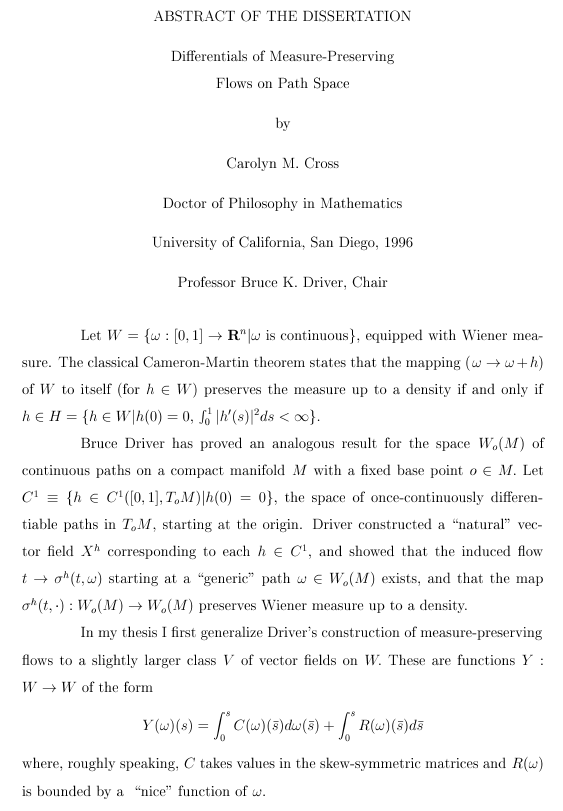"Differentials of Measure-Preserving Flows on Path Space" by
Carolyn Cross.
(UCSD Thesis, August 1996) )

The manuscript is available as a
PDF file (546K)


Abstract
Let $W=\{\omega :[0,1]\to {\bf R}^n|\omega\mbox{\rm \ is continuous}
\},$ equipped with Wiener measure. The
classical Cameron-Martin theorem states that the mapping
$(\omega\to\omega +h)$ of $W$ to itself (for $h\in W$) preserves the measure up
to a density
if and only if
$h\in H=\{h\in W|h(0)=0,$ $\int_0^1|h'(s)|^2ds<\infty \}$.
Bruce Driver has proved an analogous result for the space $W_o(M)$ of continuous paths on a compact manifold $M$ with a
fixed base point $o\in M.$ Let $C^1\equiv \{h\in C^1([0,1],T_oM)|
h(0)=0\},$ the
space of once-continuously differentiable paths in $T_oM$,
starting at the origin.
Driver constructed a ``natural'' vector field $X^h$ corresponding to
each $h\in C^1$, and showed that the induced flow $t\to\sigma^h(t
,\omega )$
starting at a ``generic'' path $\omega\in W_o(M)$ exists, and that the
map $\sigma^h(t,\cdot ):W_o(M)\to W_o(M)$ preserves Wiener measure up to a
density.
In my thesis I first generalize Driver's construction of
measure-preserving flows to a slightly larger class $V$ of
vector fields on $W.$
These are functions $Y:W\to W$ of
the form
\[Y(\omega )(s)=\int_0^sC(\omega )(\bar {s})d\omega (\bar {s})+\int_ 0^sR(\omega )(\bar
{s})d\bar {s}\]
where, roughly speaking, $C$ takes values in the
skew-symmetric matrices and $R(\omega )$ is bounded by
a ~``nice'' function of $\omega .$
I then show that members of $V$ generate
flows which are ``smooth'' in their starting path, i.e.,
differentiable via any vector field in $V.$
The proof uses a modified Picard iterates method to solve a
differential equation including a term with an
unbounded linear operator.
The second half of my thesis is devoted to the ``geometric'' result
that Driver's flows are differentiable in their starting paths.
This result is proved for both the ``transferred'' flow in $W$
and the original flow in $W_o(M).$
The $W$ case is proved by showing that the class $V$ above
contains Driver's ``transferred'' vector fields on $W,$ i.e., $Y^
h\in V$
for all $h\in C^1.$ Thus the result in Part I implies that the
``transferred'' flow $w^h(t,\omega )$ generated by $Y^h$ on $W$ is
``differentiable'' in its starting path $\omega$ via any of the vector
fields $Y^k,$ for $k\in C^1.$ I then use certain
smoothness properties of the stochastic development map to
transfer this result to $W_o(M).$
|